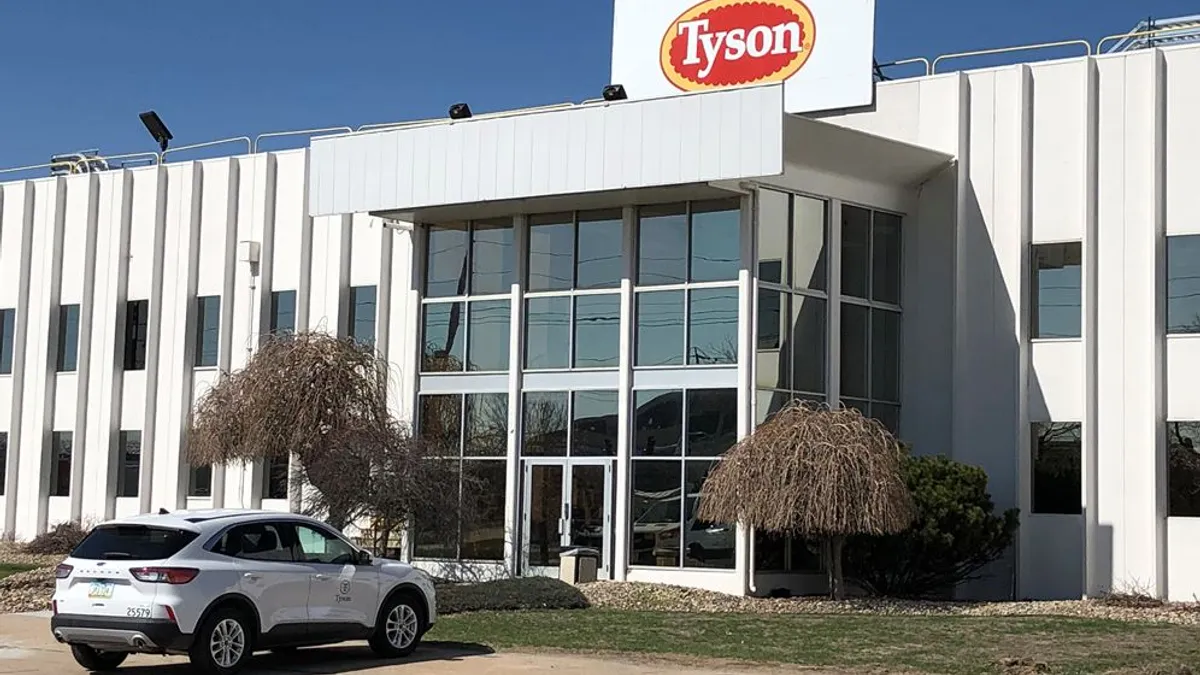Dive Brief:
- Tyson Foods is implementing aggressive strategies — such as investing in automation efforts for tasks including chicken deboning and worker retention programs — in order to improve chicken production and efficiency, which has lagged in recent years, the company told Food Dive in a statement.
- President and CEO Donnie King told the Wall Street Journal fixing supply issues is a top priority of the company, and added that it has at times purchased chicken from competitors in order to meet demand.
- Demand for chicken, which has been on the rise, is further exacerbating existing supply issues in the meat space.
Dive Insight:
Tyson needs to fix its supply chain if it wants to maintain its foothold on the chicken space. During the pandemic, profits from the company’s beef business offset problems with chicken, the Wall Street Journal noted. However, consumers are predicted to trade down from beef to chicken this year due to surging beef costs, according to CoBank analysts. Tyson will continue to see its chicken demand spike — and could have a lot to catch up to.
But Tyson’s poultry segment has profitability issues — a problem it has faced for some time. It posted a $625 million operating loss for its poultry business in fiscal year 2021, after passing higher costs for labor, feed and transportation on to consumers. Tyson’s adjusted operating margins have been decreasing since 2016, the Wall Street Journal noted.
Tyson’s biggest chicken rivals have steadily increased their profits this year. Pilgrim’s Pride’s sales grew 29.5% year-over-year in the last quarter. Net sales of Sanderson Farms’ chicken products were up nearly 36% over the previous year in the last quarter. And if Sanderson’s pending merger with Wayne Farms receives regulatory approval, the larger company would be in prime position to take market share away from Tyson.
King, who became Tyson’s president and CEO in June 2021, is a company veteran aiming to make his mark as a leader. In the past year, he has worked toward increasing the company’s manufacturing capacity, breaking ground on its $355 million bacon plant in Kentucky and committing to spend $1.3 billion on automation over the next three years.
He’s also presided over new investments in worker programs. In Tyson’s statement to Food Dive, the company mentioned employee education programs and health clinics at or near facilities as part of its strategy to retain labor. The meat giant also implemented a pilot program for a four-day work week at facilities in Arkansas and Pennsylvania, which it said has attracted positive feedback from employees.
Although predictions indicate more consumers will turn to chicken as inflation constrains their spending, Rabobank said in its annual poultry industry report last week that global poultry demand may slow down compared to previous years. The financial institution projected demand will only grow between 0.5% and 1% this year, a decrease from a normal year’s growth of 2.5%. The report partially attributes the slowdown to supply chain issues in the space — which Tyson may have contributed to. However, slowing demand could also provide an opportunity for Tyson to catch up, if the problems at the company don’t get worse.
Despite recent difficulties, Tyson has seen a massive jump in sales as it’s passed along costs related to inflation to consumers. In its most recent quarter, Tyson’s sales increased 16% as it raised the prices of its products 23.8% year-over-year. In that earnings call, King said the company is not simply “pricing for inflation;” they are doing “everything we know to become more productive.”















